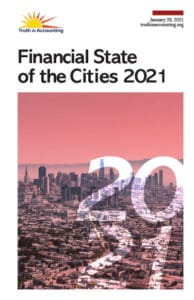
A new report shines a spotlight on city finances, indicating that 62 of the nation’s 75 largest cities do not have enough money to pay their bills.
Truth in Accounting’s (TIA) fifth annual Financial State of the Cities (FSOC) report is based on an analysis of the nation’s 75 most populous cities based on fiscal year 2019 comprehensive annual financial reports (CAFRs). This report offers an in-depth look at the state of municipal finance before the pandemic and lockdowns of 2020.
At the end of the fiscal year (FY) 2019, 62 cities did not have enough money to pay all their bills. This means that to balance the budget, elected officials did not include the true costs of the government in their budget calculations and have pushed costs onto future taxpayers.
TIA divided the amount of money needed to pay bills by the number of city taxpayers to come up with a measurement the organization refers to as the Taxpayer Burden. If a city has money available after all bills are considered, that surplus amount was likewise divided by the number of taxpayers to come up with the Taxpayer Surplus. The cities were ranked based on these calculations.
TIA assigned grades to the cities to give greater context to each city’s Taxpayer Burden or Taxpayer Surplus. A municipal government received a “C,” or passing grade if it comes close to meeting its balanced budget requirement, which is reflected by a small Taxpayer Burden. An “A” or “B” grade is given to governments that have met their balanced budget requirements and have a Taxpayer Surplus. “D” and “F” grades apply to governments that have not balanced their budgets and have significant Taxpayer Burdens. Based on the organization’s grading methodology, no cities received A’s, 13 received B’s, 28 received C’s, 28 received D’s, and six cities received failing grades.
Cities, in general, did not have enough money to pay all of their bills. The total debt among the 75 most populous cities, according to the report, amounted to $333.5 billion – a figure that does not include capital assets or the related debt. Most debt comes from unfunded retirement benefit promises, such as pension and retiree healthcare debt. For FY 2019, pension debt accounted for $180.1 billion, and other post-employment benefits (OPEB) totaled $160.1 billion.
TIA was unable to include two of the most populous cities — Newark and Jersey City — because they do not issue annual financial reports that follow generally accepted accounting principles (GAAP). Instead, the organization included the next two largest municipalities (Chula Vista and Fort Wayne) based on the U.S. Census Bureau’s 2017 population estimates.









